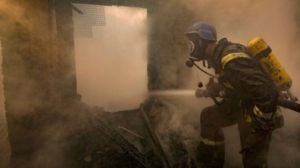Get out of Najaf: Allawi tells Sadr men
Iraq’s Prime Minister ordered Shi’ite fighters to lay down their weapons and leave Najaf on Sunday, but fighting raged on with US ...

Iraq’s Prime Minister ordered Shi’ite fighters to lay down their weapons and leave Najaf on Sunday, but fighting raged on with US helicopter gunships pounding guerrilla positions.
Four days of intense fighting in the heart of Najaf, across southern Iraq and in several districts of Baghdad has raised fears of a second Shi’ite Muslim uprising and piled pressure on PM Iyad Allawi’s 40-day-old interim government.
In an effort to staunch growing Shi’ite radicalism and a 16-month Sunni-led insurgency, the government has in the past two days introduced an amnesty for low-level guerrillas while reinstating the death penalty for hardline criminals.
Despite that carrot-and-stick approach, however, fighting shows little sign of abating, and kidnapping — a common currency of insurgents in recent months — continues apace.
During a tour of Najaf on Sunday Allawi urged militants to down their weapons or face the consequences. ‘‘There is no negotiation with any militia that bears arms against Iraq and the Iraqi people,’’ he said. ‘‘I believe gunmen should leave the holy sites … lay down their weapons and return to the rule of order and law.’’
Hundreds of Shi’ite militants have been killed or wounded in Najaf over the past four days, according to the US military and medical officials, as clashes between US forces and rebel cleric Moqtada Al-Sadr’s militiamen intensify.
A witness on Sunday saw two Apache gunships fire missiles at defences manned by Sadr’s militia near Najaf’s ancient cemetery. The militia, known as the Mehdi Army, dug in, laying mines around the burial ground’s crypts and mausoleums. US soldiers advanced on the city’s Imam Ali shrine tightening a noose around insurgent positions, while loudspeakers exhorted the militia to fight back, ordering: ‘‘Engage in Jehad’’.
Clashes also erupted anew in Baghdad’s Sadr City, and in other areas, while across southern Iraq tensions remained high in several Shi’ite-dominant cities, including Nassiriyah, Amara, Basra and Diwaniya. In Karbala, an Iranian diplomat was kidnapped by militants, according to the Iranian embassy. The string of abductions, mostly targeting foreign truck drivers, appears aimed at forcing foreign governments to pull out.
An aide to Sadr rejected the Allawi’s demand and said the Mehdi Army would never leave Najaf.
A senior US military official in Baghdad said marines had put a circle around the area to cut off supplies. He said the marines and Iraqi security forces numbered 5,500 men.
Backing up Allawi’s threats to get tough with insurgents, the interim government reinstated the death penalty for crimes including murder, kidnapping and drug offences.
Capital punishment, used liberally during Saddam Hussein’s rule, was suspended by US occupying authorities last year. Since coming to power on June 28, the new government had repeatedly threatened to reintroduce it. It was not clear if the law would be retroactive, casting doubt on whether Saddam and his henchmen could face death if found guilty.
Nor was it certain when the law would come into force or how executions would be carried out. The law’s introduction came a day after Allawi announced a 30-day amnesty for insurgents who have committed crimes — an effort to draw less hardline elements to the government’s side. — (Reuters)
Photos



- 01
- 02
- 03
- 04
- 05




























